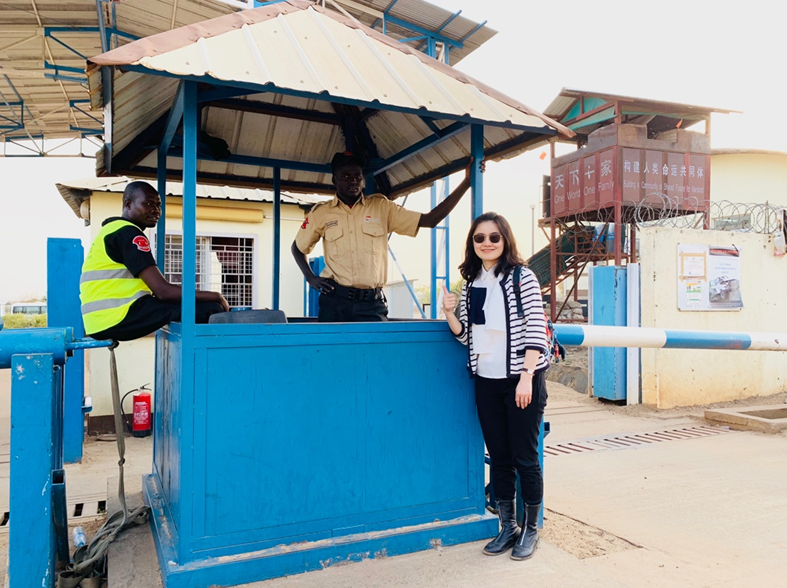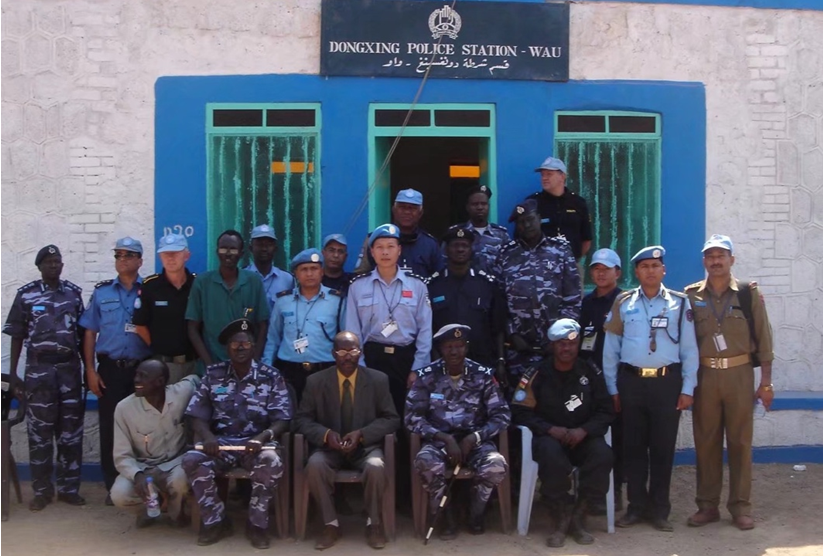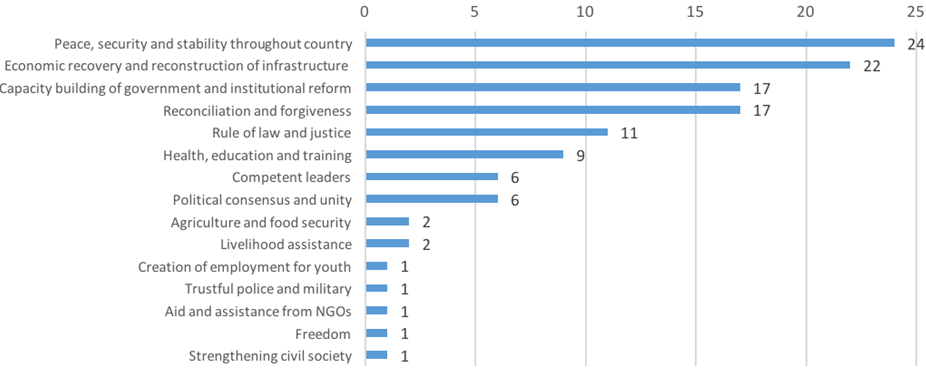
By Meng Wenting
My first African friend is Awan from South Sudan. I met him in Beijing while I was working on my research on China’s participation in UN peacekeeping. He told me that his first foreign friend is a Chinese worker who built a bridge near his living place in his hometown, Rumbek. Our friendship and experiences reflect a long history of China-South Sudan relations. I believe people to people exchanges will result in profound insights and deepened understanding.
Later I made my first-ever visit to South Sudan, the country I had read on tremendously but never really felt it. During my field trip, fifteen in-depth interviews were conducted with individuals from a broad cross-section of national and international stakeholders, including think tanks, multilateral agencies, diplomats, military personnel, business people, and non-government organizations (NGOs). I find China’s peacebuilding in South Sudan are highly appreciated and valued by the people on the ground.
After decades of civil wars, the people of southern Sudan voted to secede from the north in an attempt to escape the violence. On declaring independence in 2011, South Sudan was one of the least developed places on earth, but with the ability to draw upon significant oil reserves worth $150 million a month, the foundation for a successful future was firmly in place. Unfortunately, deep fissures in its ruling party were laid bare and that dispute turned into nationwide ethno-political conflicts in late 2013 and relapsed again in 2016. In those decisive moments, China always acts as a responsible country.
CNPC: commercial peace brings a shared future
China is South Sudan’s largest trade partner, which is also the case for more than 100 other countries worldwide. The most often mentioned investment is the oil investment by the Chinese National Petroleum Company (CNPC), which is actually jointly operated by the CNPC, Petronas of Malaysia, Indian Oil and Natural Gas Corporation, and Nilepet of South Sudan. Among these four stakeholders, China and Malaysia have almost equivalent shareholding. However, very few Malaysians are working in South Sudan due to the challenging environment. Although people often believe that China is the single largest investor in the oil industry in South Sudan, this is not accurate.

When the deadly civil war broke out in December 2013, every country was seeking to evacuate its nationals in emergency conditions. All the employees of the US Embassy have withdrawn from Juba. Surprisingly, this state-owned company CNPC chose to stay and the larger Upper Nile state fields remained operational though some other fields were targeted and destroyed by the rebels. Chinese diplomat Zhong Jianhua, then special representative of the Chinese government on African affairs, China’s Foreign Policy Experiment in South Sudan, said Beijing was driven by “a sense of responsibility” to preserve South Sudan’s economic future, which lives or dies with the oil industry. Indeed, Statistics show that almost all of the South Sudan government’s income is from the oil business. In a long time after the civil war, CNPC has been supporting South Sudan's national economy in the cost of its own profits. In January and February 2016, when benchmark crude oil prices dipped to below $30 per barrel, CNPC lost nearly $2 million a day.
A friend in need is a friend indeed. CNPC helps stabilize South Sudan’s economy and prevent a new round of mass chaos. It brings “commercial peace” to the country. China was highly appreciated as an important trade partner by the government of South Sudan. Additionally, 90 percent of CNPC employees in the fields are from local places, which benefits the civilians of the country. CNPC also donated money on a number of physical constructions for the South Sudanese. It helps build the Protection of Civilians (POC) site 3 of the United Nations Mission South Sudan (UNMISS), which is the home for thousands of internal displaced people. This vividly demonstrates China’s position on South-South cooperation, as President Xi said at the Opening Ceremony of the 2018 FOCAC Beijing Summit “China has stood with African countries and always follows the principle of pursuing the greater good and shared interests.”
Chinese peacekeepers: great professionalism and people-centred approach
China contributes to the security and stability of South Sudan through its contribution of peacekeepers to the UN mission. China currently is the 10th highest provider of the peacekeepers on the ground and China has consecutively deployed its peacekeeping infantry battalions to South Sudan since 2015. In March 2019, there was 1067 Chinese UN peacekeeping personnel deployed to South Sudan, including 1031 contingent troops, five experts on mission, 12 individual police officers and 19 staff officers.
Recently, the fifth Chinese infantry battalion was dispatched to South Sudan, and almost 20% of them have prior peacekeeping experience. Chinese peacekeepers are perceived as dedicated to their work, professional, and highly disciplined. “I have worked very closely with them and they have continuously shown great professionalism and dedication in their work here at UNMISS and South Sudan,” said a senior official of the UNMISS.
Top Ten Troop Contributors in UNMISS as of March 2019

In addition to guarding the UN’s POC sites, Chinese peacekeepers also help build roads and provide long distance patrolling in order to benefit mass civilians in South Sudan. I also find one police station in Wau is named after a Chinese peacekeeping police officer Sun Dongxing. Officer Sun collected money and helped rebuilt this police station which was in charge of the safety of all the people in the area. He also provided capacity trainings to the local police. To honor and thank him as well as all the Chinese peacekeeping police for their contribution to the peace and development of the region, the head of the police department of the state came to the station by himself and show his appreciation. It is the first and only local police institution in Africa named after a Chinese police officer. One businessman from Wau even names his son “Dongxing”. He wishes his son the best and in his mind Dongxing stands for a peaceful and prosperous future.
With the well-constructed work place and competent police, the local public order and personal security will also be protected in a sustainable way after the UN peacekeepers leave the country. As a Chinese old proverb says, it's better to teach a man fishing than to give him fish alone. In the latest reform on the UN Peace Operations, it is reiterated on the significance to include the local counterpart and empower them through capacity building. Chinese peacekeepers have actively engaged with the communities and spared no effort to bring a sustainable peace to South Sudan.

Chinese peacebuilding: meet the needs from the local
What does South Sudan people need most in the post-conflict reconstruction? They explicitly say: they need feel safe, they need development, rather than participation in election or various international NGOs. “Infrastructures and food security are two areas which are very important for South Sudan. Food security provides stability, and infrastructure gives opportunity for people to move around.” said South Sudanese Ambassador John Andruga Duku. Development and reconstruction are in high demand of both the government and the people in South Sudan after the conflict. China’s approach of peacebuilding attract attention from African researchers. Based on his observation and field research in Liberia and South Sudan, a senior researcher Dr. Steven Kuo from South Africa concludes in three characteristics of Chinese Peace: sovereignty, stability, and primary on economic development.

Indeed, China respects sovereignty of South Sudan and places emphasis on its support for the principle of African solutions to African problems. China prefers to support mediation process led by regional organization, IGAD, which plays a significant role in peace negotiation among the parties in South Sudan. As a professor from Juba University said, China comes to South Sudan with respect. China does not use force or sanctions to impose its views, but sees sanctions or their threat as leverage to influence future behaviour instead of punishment for past behaviour.
In terms of development and humanitarian assistance, China helped construct a host of hospitals and schools in South Sudan. Chinese government has sent six medical teams to South Sudan which operate on a yearly rotation. They work in the Juba Teaching Hospital which was also funded and constructed by China. Currently, Sinohydro is building a dam to generate electricity, which will feed the first power grid system in South Sudan. During the Forum on China-Africa Cooperation (FOCAC) Beijing Summit of 2018, President Xi announced that China will provide a 300 million yuan ($41 million) grant and 100 million yuan ($13 million) in emergency food aid to South Sudan. As of early February 2019, 1000 tons of food has been transported to Juba for the South Sudanese.
Since the recent September 2018 peace agreement, there has been a significant reduction in violent conflicts and hope has increased that the peace agreement can result in a more stable and peaceful period for the country. China is the only one of the five permanent members of the Security Council of the UN that has endorsed the current agreement in South Sudan. This demonstrates China's commitment to peace and friendship. As South Sudan Ambassador John said, “China is a strategic partner for South Sudan”. I hope there will be more ‘creative involvement’ of Chinese people in this country, bringing a peaceful and prosperous future through win-win cooperation. We will build a community of shared future for mankind.
The author is a PhD candidate from the School of International Studies at Peking University. Her findings are based on her field research in South Sudan and Ethiopia from January 19th to February 16th 2019, conducted with funding from the Social Science Research Council.
The opinions expressed here are those of the writer and do not represent the views of China Daily and China Daily website.









